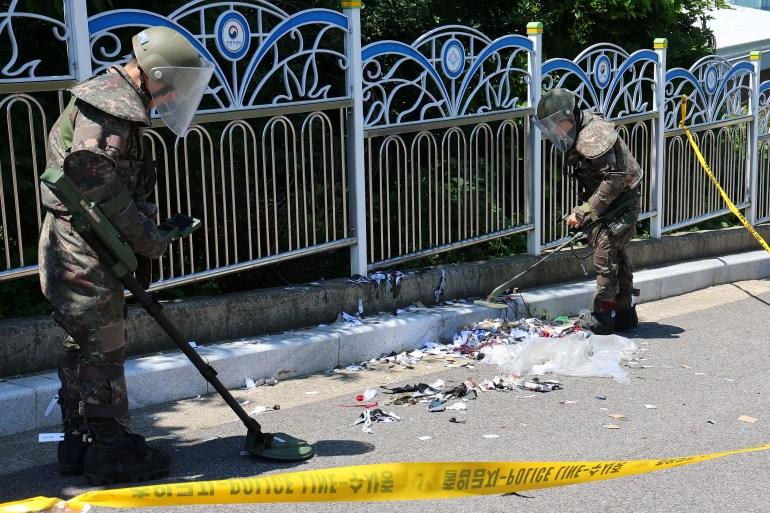Source: ALJAZEERA
ALJAZEERA MEDIA NETWORK

The escalating friction between North and South Korea intensifies as Pyongyang launches balloons filled with trash, prompting Seoul to reinstate military activities along the border.
Rising tensions are again evident on the Korean Peninsula following the launch of numerous balloons by North Korea, which dropped trash and manure on South Korean towns and even Seoul’s main airport runway.
In response, the South Korean government announced on Tuesday the suspension of an inter-Korean military deal from 2018, which was intended to ease tensions along their heavily fortified border.
The suspension will allow South Korea to resume extensive military exercises near the border and restart propaganda broadcasts, including K-pop songs and foreign news through border loudspeakers.
North Korea initiated this balloon campaign the previous week, launching approximately 260 balloons carrying cigarette butts, cloth scraps, waste paper, and manure into South Korea. These balloons, carried by winds, landed across various regions, even reaching Geochang, about 218km (135 miles) south of Seoul, reported Yonhap news agency.
The campaign was accompanied by attempts to jam GPS systems in South Korea.
The South Korean military described these actions as “base” and “dangerous,” deploying teams to inspect and collect the balloon-borne trash. Residents were cautioned to avoid and report any sightings, but later it was confirmed that the materials did not pose any immediate risk.
North Korea claimed the balloon launches were a counteraction against South Korean defectors and activists who send anti-Pyongyang leaflets, food, medicine, money, and USB sticks loaded with K-pop videos and dramas across the border.
Kim Yo Jong, the sister of North Korean leader Kim Jong Un, criticized Seoul for condemning the balloons while supporting its citizens' freedom of speech. She claimed the balloons were “gifts” from North Koreans who “cry for freedom of expression”.
North Korea is notably sensitive to the leaflets sent by South Korean activists as they often contain external information and criticisms of the Kim family’s rule since the state’s establishment by Kim Il Sung in 1948.
In protest against such leafleting campaigns, North Korea blew up an empty liaison office built by South Korea in Kaesong in 2020. Although this office had been evacuated in January 2020 due to the COVID-19 pandemic.
Seoul had attempted to curb these activities by approving a law in 2020 making the sending of anti-Pyongyang leaflets a crime, which was later struck down in 2023 by South Korea’s Constitutional Court, deeming it an overly restrictive measure on free speech.
On Sunday, after the first trash-laden balloons from North Korea were discovered, South Korea reported collecting an additional 700 bags of trash from North Korea.
This led South Korean President Yoon Suk-yeol to convene a National Security Council meeting, which promised “unendurable” measures in response and condemned the balloons and GPS jamming as an “irrational act of provocation”.
Later that night, North Korean Vice Defence Minister Kim Kang Il announced a temporary suspension of the balloon activities, claiming that 3,500 balloons carrying 15 tonnes of waste had been launched, giving South Koreans a firsthand “experience” of the nuisance. He warned of intensified responses if South Korean activists resumed sending propaganda leaflets.
Despite this suspension, the South Korean government on Tuesday declared the cessation of the 2018 inter-Korean military agreement, citing safety threats and property damage caused by the large-scale balloon launches.
South Korean Deputy Defence Minister for Policy, Cho Chang-rae, stated, “The responsibility for this situation lies solely with North Korea,” and warned of swift and strong military responses to any further provocations in coordination with US support.
The 2018 agreement was forged during a brief thawing of relations between Kim Jong Un and then South Korean President Moon Jae-in, with both sides pledging to cease all hostile acts, including propaganda broadcasts and military drills near their border.
This deal has been under strain for some time. Following a spike in tensions last November over North Korea’s spy satellite launch, South Korea announced partial suspension of the deal and resumed aerial surveillance. North Korea then declared itself no longer bound by the pact, rearming guard posts that had previously been dismantled.
North Korea has not yet responded to South Korea’s full suspension of the 2018 deal, but South Korea’s renewed military exercises or propaganda broadcasts are likely to prompt equivalent or stronger actions from North Korea.
Your email address will not be published. Required fields are marked *